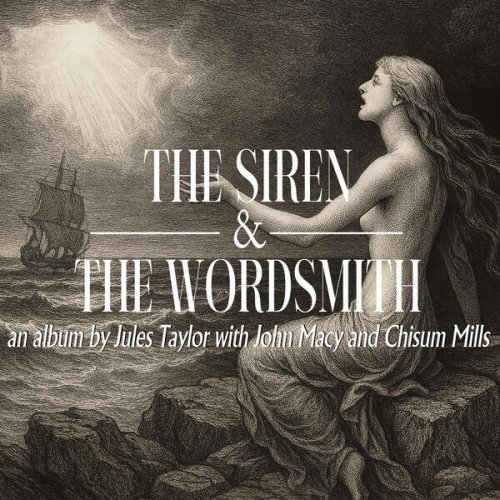Jules Taylor - The Siren and the Wordsmith (2025) [Hi-Res]

Artist: Jules Taylor
Title: The Siren and the Wordsmith
Year Of Release: 2025
Label: JulesTaylorProductions
Genre: Country
Quality: mp3 320 kbps / flac lossless (tracks) / flac 24bits - 96.0kHz
Total Time: 00:45:34
Total Size: 107 / 249 / 866 mb
WebSite: Album Preview
TracklistTitle: The Siren and the Wordsmith
Year Of Release: 2025
Label: JulesTaylorProductions
Genre: Country
Quality: mp3 320 kbps / flac lossless (tracks) / flac 24bits - 96.0kHz
Total Time: 00:45:34
Total Size: 107 / 249 / 866 mb
WebSite: Album Preview
01. She's Yours
02. Before I Pray
03. If I Were the Devil
04. Narrowly Survived
05. Song to the Siren
06. Urgent with God
07. Easier
08. The Siren and the Wordsmith
09. Twenty Twenty Vision
10. Quit You
Jules Taylor writes songs like someone returning from a long war—clear-eyed, blunt, and unafraid to name the wreckage left behind. Each lyric is whittled to its essential grain: a lover lost to cirrhosis, existential doubt and confrontation, and working people caught in larger machinery. His songs read like frontline dispatches of grief, love, and class struggle.
Born and raised in South Texas, Taylor came up through a lineage of hard-earned clarity, first as a lover of literature and philosophy, then as a songwriter and poet carving meaning out of the debris. His moral lens owes as much to Sartre, Marcuse, and Dante as it does to the dust-blown fatalism of Cormac McCarthy. Where most Country Music keeps its gaze on back roads and broken hearts, Taylor zooms out to the scaffolding beneath them: ontology, ethics, power. The philosophical payoff is clarity without anesthesia. His lyrics do not comfort. They reveal.
The Siren and the Wordsmith is the most literary and emotionally punishing work of Taylor’s career, a concept album shaped like a descent and designed like a scripture. The Siren at the center of the record is a musical transfiguration of a real woman, Brewer, Taylor’s former partner, who died in 2024 of cirrhosis. Their relationship was volatile, tender, and unsalvageable. After her death, the songs Taylor had shelved—too painful, too raw—took on new meaning. He picked them back up not to rewrite them, but to recontextualize them. Like Dante writing Beatrice into the stars, Taylor elevates Brewer into something mythic: not a woman to be mourned, but a metaphysical force to be reckoned with.
The album opens with “She’s Yours,” not with loss, but with intimacy. The song challenges the language of possession in romantic relationships, unfolding in moments so small they could be missed: the way a look lingers, the way a presence reshapes your habits. This isn’t about losing someone. It’s about what it means to have loved them completely, privately, in the tiny exchanges that alter who you are. The song finds its truth in detail, in the unspoken contracts of closeness.
“Before I Pray” pivots from personal to existential. The sky has drained of color, and the divine is silent. The world has lost its vibrancy. And yet the song pushes forward, not as a cry for help, but as the beginning of a rebellion. This is where the hero myth breaks. The narrator acknowledges he is not chosen, not destined. He walks forward anyway. The song is less a plea than a refusal to be saved. It marks the first crack in the framework and the first moment of defiance.
“If I Were the Devil” brings the philosophical current into sharper focus. Sung from the voice of the adversary, it pulls apart our inherited systems of reward and punishment. Heaven looks like a prison. Hell, like a refusal to comply. The devil here isn’t a villain. He’s a seducer armed with reason. The heresy in this song is its moral clarity.
“Narrowly Survived” is perhaps the quietest song on the record, but its sparseness is deceptive. This is where guilt settles in. Not the performative guilt of someone caught, but the ache of someone who lived through something they shouldn’t have. It’s survivor’s guilt, carried without melodrama.
Taylor’s cover of Tim Buckley’s “Song to the Siren” is not an interlude but a liturgical echo. In this context, the Siren is no longer a distant figure. She is Brewer, mythologized. The plea to “sail to me” becomes a ritual reenactment, calling back what cannot return. It’s not a reinterpretation so much as a requiem, a way of singing through the absence, of giving form to the void she left behind. By placing it here, Taylor doesn’t just honor the original; he folds it into his own myth. The Siren isn’t summoned. She’s already there, humming beneath every chord. The song becomes less a cover than a communion.
“Urgent with God” brings us into confrontation with the divine. Not reverence, but urgency. Taylor demands an answer from the divine. “Why give us a choice when there’s no choice at all?” It’s not sacrilegious. It’s honest. This is the theology of someone who has lived too long with unanswered prayers and has decided to rewrite the liturgy.
“Easier” offers no resolution. Its central irony is its title, because nothing has gotten easier. The track lingers in a kind of exhausted acceptance. Love didn’t fix it. Faith didn’t fix it. Time didn’t fix it. But he’s still here. That’s the refrain. Not redemption. Just endurance.
It’s not until track eight, “The Siren and the Wordsmith,” that the album’s cosmology is fully declared. The Siren calls. The Wordsmith follows. He crashes, survives, and writes. The song reframes everything that came before it—the love story, the loss, the philosophical spirals. They’re elements of a mythic loop. “Sirens won’t be sirens if they don’t sing / And sailors won’t be sailors without the sea” serves not as justification, but as inevitability. This is not a tale of rescue but of transfiguration. And this is where Brewer becomes Beatrice, not as savior, but as the compass of the entire journey.
“Twenty Twenty Vision” is a cover of the Jimmy Martin bluegrass classic, and its inclusion anchors the album’s arc. In a collection so heavily layered with existential weight and literary scaffolding, this song lands as plainspoken truth of the torment a woman can leave behind. No metaphor, no theory, just heartache, clean-cut and unrevised. In this context, it functions like a touchstone to tradition, calling back to the roots of Appalachian grief songs and male vulnerability before it became stylized. Taylor doesn’t reinvent it. He sings it straight, letting its emotional weight carry the cultural memory it comes from.
Finally, “Quit You” closes the record not with a bow, but with a loop. It circles back to emotional, chemical, and relational compulsion. The line “I quit everything else but can’t quit you” is both confession and condemnation.
The Siren and the Wordsmith is an album about mapping the terrain of the unhealed. It doesn’t offer closure, because some stories don’t close. If there's a genre to place it in, call it dark Americana, but only if you're willing to stretch that term to include philosophical odyssey, literary griefwork, and Southern fatalism sharpened into spiritual architecture. Taylor deepens the tradition, stripping it to its ethical core.
This is not a record for casual listening. It’s a pilgrimage. A reckoning. A moral excavation through wreckage, memory, and the cost of loving what you cannot save.
In The Siren and the Wordsmith, Jules Taylor has crafted an album that is as haunting as it is beautiful. Each song feels like an intimate confession, a window into Taylor’s soul where the light of love and dark shadows meet in equal measure. The album’s themes of addiction, love, loss, and existential questioning resonate with a depth that lingers well beyond its final track.
Taylor’s journey from self-doubt to self-awareness is evident in every note. This is more than an album—it is a therapeutic release, a kind of catharsis from an artist who has spent years fighting both his demons and his desire to connect. Whether through the Siren’s call or the Wordsmith’s struggle, Taylor has created something timeless, something that speaks not just to his own experience, but to anyone who has ever loved, lost, or searched for meaning in the dark.
The Siren and the Wordsmith is a testament to Jules Taylor’s ability to blend folk, country, and rock into a deeply personal yet universally resonant record. It is an album for the broken-hearted, the introspective, and the seekers of truth. Simply put, it is a masterpiece.








